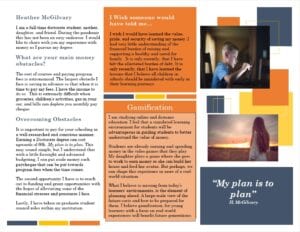The clock is counting down as we draw near to announcing our scholarship winner for the first half of 2021. With that, here’s another essay submission we’re sharing.
Our Essay Questions
- As a college/university student, what are your main money obstacles and what do you plan on doing to address these issues?
- Looking back, how should schools have taught money management to children under 18
C.G.’s Response
Take any Netflix, Apple TV+ or HBO television show staring college students and the drama that encompasses their lives is all relational: a partner is caught cheating, unrequited love, the athlete doesn’t make the varsity team, a child of a business guru discovers an adoration for the performing arts… you name it. Engaging? Yes. Realistic? No. In reality, pertaining to the lives of Canadian university students, the biggest struggle that students face is answering the question, “How am I going to afford this?”
Looking for more money for school? Enter our scholarship essay contest!
When I began university, I, like my peers, anticipated the relational soap operas that had been integral to the plots of books and tv shows I loved. Yet, contrary to the characters of Gossip Girl, words like “co-op”, “budget” and “scholarships” were ingrained in my vernacular. The biggest financial hurdle I expected to face was affording my tuition, but for so many reasons tuition began to look more and more like an anthill in contrast to the other financial obstacles that arose. Over time, I learned in what areas I could reduce my spending and in what areas costs could simply not be reduced without comprising my wellbeing or chance at success.
Despite being in the internet age, universities have not made mandatory course reading material much more affordable. E-books rival the price of most hard-copy textbooks and second-hand textbook sales through university-run bookstores tend to only shave off upward of 10 or 20 percent of the cost. A graphic design student like myself, however, now scoffs at the ease of a one-time purchase when I am having to pay out-of-pocket for monthly app subscriptions (such as Adobe and InDesign) to expensive design programs, fonts, hard drives and monitors. Needless to say, the price of a course may proclaim to be $500, but the actual price of a course far exceeds that number due to additional learning material (these extra reading materials listed in the syllabus being a financial hurdle unto themselves). Through experience, however, I have found that the best way to reduce the cost of said requirements is by speaking to the professor directly. Sometimes asking the questions like, “will we be reading the entire manual or one passage from it?” can help determine if it is worth purchasing the book or renting it for a short time from the library. And, should that be the case, sometimes asking questions like that directly will prompt the professor to request permission from the department to share a photocopy of the page rather than asking the students to purchase the entire book itself, saving myself and my peers hundreds of dollars. Moreover, engaging in a transparent conversation with one’s professor about the matter can sometimes illuminate for the instructor just how expensive the collective cost of additional reading material is for the student body and will sometimes inspire them to seek out free or more affordable learning material moving forward. This experience of speaking with my professors and asking the right questions taught me that there are ways of accruing mandatory reading material more cheaply, slightly lessening the financial burden of post-secondary education.
Certainly, a money obstacle for many young adults is simply a lack of financial literacy. How does one know how to be fiscally responsible when one has never been formally taught what to do and what not to do? I have been fortunate in that through various work terms and my professional ballet training at Canada’s National Ballet School I have been surrounded by some remarkably intelligent people who were well-versed in money management. While it is always nerve-wracking to put oneself out there and state what you do not know, I did just that and asked people in my communities if they could share some of their wisdom with me about money management. Generously, some of these individuals enthusiastically agreed and gave me some tips as well as directing me to some excellent books for further self-study (such as The Wealthy Barber). Through this process, I learned several tips that I have implemented as a regular practice in my life. Firstly, I began tracking my spending in a spreadsheet to better understand my monthly output in order to ask myself, “is there a category here in which I could be spending less?” One such area in which I was able to save money each month was additional banking charges that are often waived for students. By setting up a no-fee banking account, I was able to avoid additional charges each month. I also became more aware of transportation costs, particularly how expensive transportation is in cities (where I was and will continue to be doing my studies). Through my budgeting spreadsheet, it prompted me to calculate the difference in monthly bus passes versus individual tickets and inspired me to bike more often to and from campus (which was also great for my physical health to automatically incorporate more fitness into my daily routine). Overall, while a lack of financial literacy is a huge obstacle for many young adults (particularly students), asking those around you who display responsible money practices for advice is a great way to start getting educated in the subject and become more fiscally responsible moving forward.
That being said, as much as budgeting gave me insight into what areas I could cut back on my spending, through trial and error I also came to the understanding that there were some areas in which I could not cut costs without my education suffering; some financial challenges simply could not be avoided. When students are accepted or sometimes even recruited to schools, the institution is placing bets on these individuals to succeed in their program of choice. But, what makes a student successful, really? From my own lived experience, those of us who rose to the top and excelled at our studies had one trait in common: we prioritized our physical and mental health. One might think, “Of course! That makes sense. They were the Type-A young adults who favoured study groups to keggers,” but, I challenge this notion that an answer as straightforward as a personality type can be the answer to what makes someone live out a healthier lifestyle during university. In fact, I believe that the expense of living healthily–the cost of a gym membership, the cost of counselling, the cost of nutritious food and other health expenses—is the biggest barrier to students “succeeding” at their studies, because, quite frankly, they cannot afford to be healthy, which hinders their ability to perform well at school. In my own education journey, I at times sacrificed my health in an effort to save money, and I felt the impact that had on my academics. When I was in my second year of university, I felt my stress levels rise looking at the cost of living in Victoria (where I was enrolled in The Creative Writing and Gender Studies programs at The University of Victoria). While I was desperate to live off campus to be able to cook for myself to make healthier meals (since in residence we had no amenities to make our own food), I immediately inquired about staying another year in residence to lower my cost of living. The only way to guarantee a spot in residence, however, was to become a RECL—a Residence Education Community Leader. To this day, this job was one of the most challenging and rigorous I have ever held. I worked at all hours of the day and night. If a student was experiencing a mental health crisis, I was the first responder. If a student had overdosed, I was usually the one who found them and called 9-1-1. While this job taught me so many skills that have aided me in my communications and marketing career, the lack of sleep, the lack of time for self-care and exercise, plus the salty, starchy cafeteria food took a toll on my mental and physical wellbeing. Yet, it was a choice I felt compelled to make to save money. As a consequence of the 24/7 nature of this emotionally demanding job, that year was the first time I had ever felt my grades slip, and despite my best efforts, I felt like my brain wasn’t “on”—couldn’t be “on,” in fact, because I wasn’t fuelling my body with the nutrition it needed to think clearly, giving myself rest when I so desperately needed sleep or removing additional stresses from my life that were impeding on my ability to focus. So, when it came to entering my third year of university, I knew that I had to make different life choices. I “bit the bullet,” so to speak, and moved off campus for my physical and mental health, I took on even more work in the summer and did extra co-op terms—more than what was mandatory for my program—to ease my financial burden as well as work during the school year with more structured hours and applied to scholarships that as I was eligible for. Now, looking ahead at my next academic pursuit, a Graphic Design Certificate Program at The British Columbia Institute of Technology, I know that investing in my education also includes investing in my physical and mental health. And, in times when a co-op work term cannot cover the cost of living healthily, there are scholarships I can apply for to help me succeed.
When I think back to my younger years entering university, I now realize that my monetary education was from television programs, which were based on a fictitious world where money obstacles often didn’t exist. What I really needed were classes on how to budget, how to use Microsoft Excel, how to find scholarships that were right for me, how to apply for a student loan, and of course, where to reduce my monthly expenses—like, renting a textbook from the library when appropriate in lieu of buying it brand new—and which costs are not worth “cheaping out on”—like, the cost of my health. While those lessons integrated into the high school curriculum would have saved me lots of time, through lived experience I am proud to say that now, as I look forward at my Graphic Design Certificate with goals of a Masters in Business Administration following my certificate, I am confident in my abilities to budget and budget-in my mental and physical health to excel in my studies and in my career.



